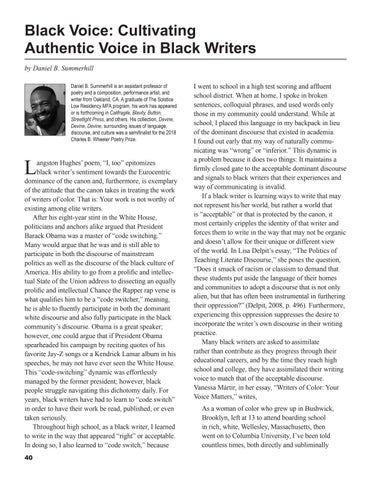Black Voice: Cultivating Authentic Voice in Black Writers by Daniel B. Summerhill Daniel B. Summerhill is an assistant professor of poetry and a composition, performance artist, and writer from Oakland, CA. A graduate of The Solstice Low Residency MFA program, his work has appeared or is forthcoming in Califragile, Blavity, Button, Streetlight Press, and others. His collection, Devine, Devine, Devine, surrounding issues of language, discourse, and culture was a semifinalist for the 2018 Charles B. Wheeler Poetry Prize.
L
angston Hughes’ poem, “I, too” epitomizes black writer’s sentiment towards the Eurocentric dominance of the canon and, furthermore, is exemplary of the attitude that the canon takes in treating the work of writers of color. That is: Your work is not worthy of existing among elite writers. After his eight-year stint in the White House, politicians and anchors alike argued that President Barack Obama was a master of “code switching.” Many would argue that he was and is still able to participate in both the discourse of mainstream politics as well as the discourse of the black culture of America. His ability to go from a prolific and intellectual State of the Union address to dissecting an equally prolific and intellectual Chance the Rapper rap verse is what qualifies him to be a “code switcher,” meaning, he is able to fluently participate in both the dominant white discourse and also fully participate in the black community’s discourse. Obama is a great speaker; however, one could argue that if President Obama spearheaded his campaign by reciting quotes of his favorite Jay-Z songs or a Kendrick Lamar album in his speeches, he may not have ever seen the White House. This “code-switching” dynamic was effortlessly managed by the former president; however, black people struggle navigating this dichotomy daily. For years, black writers have had to learn to “code switch” in order to have their work be read, published, or even taken seriously. Throughout high school, as a black writer, I learned to write in the way that appeared “right” or acceptable. In doing so, I also learned to “code switch,” because 40
I went to school in a high test scoring and affluent school district. When at home, I spoke in broken sentences, colloquial phrases, and used words only those in my community could understand. While at school, I placed this language in my backpack in lieu of the dominant discourse that existed in academia. I found out early that my way of naturally communicating was “wrong” or “inferior.” This dynamic is a problem because it does two things: It maintains a firmly closed gate to the acceptable dominant discourse and signals to black writers that their experiences and way of communicating is invalid. If a black writer is learning ways to write that may not represent his/her world, but rather a world that is “acceptable” or that is protected by the canon, it most certainly cripples the identity of that writer and forces them to write in the way that may not be organic and doesn’t allow for their unique or different view of the world. In Lisa Delpit’s essay, “The Politics of Teaching Literate Discourse,” she poses the question, “Does it smack of racism or classism to demand that these students put aside the language of their homes and communities to adopt a discourse that is not only alien, but that has often been instrumental in furthering their oppression?” (Delpit, 2008, p. 496). Furthermore, experiencing this oppression suppresses the desire to incorporate the writer’s own discourse in their writing practice. Many black writers are asked to assimilate rather than contribute as they progress through their educational careers, and by the time they reach high school and college, they have assimilated their writing voice to match that of the acceptable discourse. Vanessa Mártir, in her essay, “Writers of Color: Your Voice Matters,” writes, As a woman of color who grew up in Bushwick, Brooklyn, left at 13 to attend boarding school in rich, white, Wellesley, Massachusetts, then went on to Columbia University, I’ve been told countless times, both directly and subliminally





